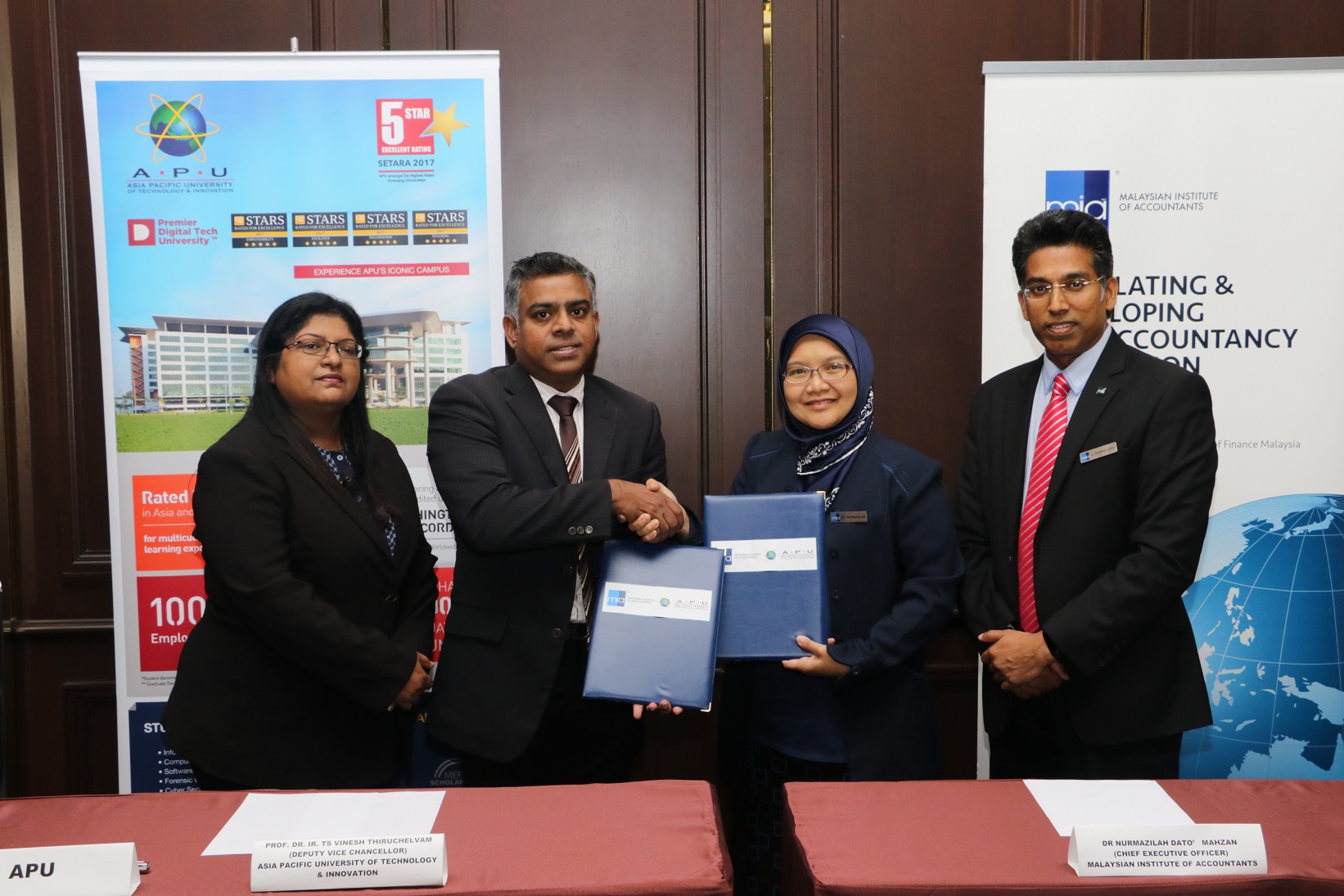Caption above L-R: Ms Geetha Rubasundram, Senior Lecturer, Head, Centre for Integrated Reporting, APU, Prof Dr Ir Ts Vinesh Thiruchelvam, Deputy Vice Chancellor, APU, Dr Nurmazilah Mahzan, CEO, MIA & G Shanmugam, Executive Director, Strategy & Development MIA.
To meet the demand for leaders that can strategise and manage digital transformation, a professional certificate in Digital Leadership is being offered by the Malaysian Institute of Accountants (MIA) and the Asia Pacific University of Technology & Innovation (APU).
The Professional Certificate in Digital Leadership (PCDL) programme, blends digital leadership theories with corporate practices and to kickstart the 3-day programme, Day One of its inaugural session began with “Leading the Digital Age” facilitated by two industry leaders. Chari TVT is a business consultant and Board member, while Dr. Sekar Jaganathan is Kenanga Group’s Digital Strategy Director.
Chari and Dr. Sekar gave several examples of digital technologies disrupting various industries today, and encouraged programme participants to think about how to disrupt and transform their respective organisations, before external factors do so.
Chari pointed out that the average lifespan of a company used to be 72 years. Today, a 15 years lifespan would be something to celebrate.
Disruption could come from outside the disrupted organisation’s industry, and he shared the example of Whatsapp, a non-telco player which is eating into the SMS, roaming and voice revenues of traditional “brick and Mortar” telcos today.
Chari added that these disruptors, called “over-the-top” players, have very different “scalable” business models using platforms, and they offer seamless services absolutely free. They are generally asset-light and generate their cash through advertisement revenue. Many telcos wanted to create their own version of “Whatsapp” but with limited success.
Dr. Sekar tackled the digital leadership topic by cautioning it is actually people, be they employees or customers, and their behaviours which can bring impact to a business.
So, customer metrics that measure the performance and quality of a brand’s engagement with customers, is very important.
He said, “A digital leader must understand that emotions play the biggest role when it comes to customers and the staff,” and concluded that people should be the main reason for organisations to embark upon any transformation journey.
Collaboration
When MIA CEO Dr. Nurmazilah Dato’ Mahzan delivered her opening remarks at the session, she observed Malaysia had seen many opportunities to accelerate development of its economy with digital technologies.
But to be a digital leader among other countries, these opportunities have to be fully leveraged.
She opined, “The foresight of a leader needs to be complemented with a team that understands what it takes to leapfrog with that foresight.”
According to Prof Dr Ir Ts Vinesh Thiruchelvan, the Deputy Vice Chancellor and Chief Innovation Officer at APU, the APU-MIA partnership to offer PCDL, is based on a common goal to spread awareness of the rapid digital traction that is taking place in Malaysia.
The context of the PCDL was designed based on MIA members’ market feedback. With these industry-based feedback requirements, APU then designed the programme content allowing for its own experts to contribute towards professional development for digital business applications.
Dr. Vinesh said, “The collaboration PCDL between APU & MIA is an outcome which sets a benchmark for digital based academia-industry relationship.”
Pipeline of certifications for technology areas
Dr. Nurmazilah also hinted at a pipeline of similar certificates that address other areas of technology. “There are other potential areas to explore such as analytics and cybersecurity. Cybersecurity is one good area that we have explored, and we are thinking of designing a programme around that.”
The objective of a cybersecurity programme from MIA’s perspective is to create awareness and education content for leaders in terms of areas that a cybersecurity leader should look at.
She said, “Many MIA members are also on management boards of public-listed companies. From our engagement with them, we find that cybersecurity is one area that keeps them awake at night.”
With that in mind, she posed the hypothetical question that from these members’ vantage point as overseers of an organisation, what are the areas they need to know about, and how should they view cybersecurity from a leader’s point of view?
She said, “Leaders need to ask the important and right questions when they talk about cybersecurity or discuss it with their experts.”
A programme that specially caters to management boards and addresses the above burning issues, would be relevant.








